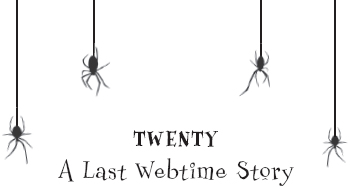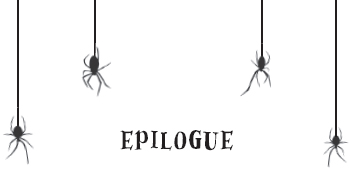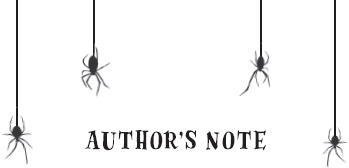Spiders on the Case (10 page)
Read Spiders on the Case Online
Authors: Kathryn Lasky


T
he next morning, the
Boston Globe
headlines screamed:
Â
VANDALS AND VERMIN INFEST
RARE BOOKS ROOM OF BPL!
Â
At ten that morning, Tom Parker held a press conference.
“Is it true, Mr. Parker, that the suspect claims she was about to be attacked by a brown recluse spider, and that's why she carried an X-ACTO blade?”
“An X-ACTO blade for a spider? C'mon, sir. Why not a can of insecticide? It's not true.” Tom turned to face the TV cameras. “What is true is that Agnes Smoot â and we now know her real name is Diane de Funk â and her husband, Eldridge Montague, are thieves who thought nothing of cutting up priceless books, treasures of the Boston Public Library. The public has been robbed. No more questions, ladies and gentlemen.”
Â
Tom went to his office and sat at his desk. The wonderful web still stretched across the computer screen. The five spiders had arranged themselves in a neat row on the top edge of the screen. “Oh, my goodness,” he whispered, overwhelmed with emotion at the sight of these tiny heroes.
At that moment, the telephone rang.
“Yes, President Wilkins.” He paused. His face went white. “Tomorrow morning ⦠so soon? Do you really feel this is necessary?” There was a long pause. “But ⦠but ⦠Yes, Mr. President. I'll put up a notice. The Rare Books Department will be sealed off. Closed. I realize ⦠quite toxic. I'll tell my staff not to come in for three days until the air clears.”
Not again!
mourned Edith.
“Good-bye, President Wilkins.” Tom wanted to slam down the telephone, but for fear of jiggling the marvelous web, he set it down softly.
Tom took off his glasses. Tears were streaming down his cheeks. “I know that I cannot understand your language, but somehow you understand mine. I think you know that this is farewell. The city sanitation department insists on sending an extermination team tomorrow.” He sighed. “Public safety, they say. If they only knew!”
Tom wiped his eyes, put on his glasses again, hit a button on his keyboard, and began to type. The screen soon pulsed with colorful pictures.

“Farewell, my friends,” Julep translated. “That's what he wrote.” She turned to Edith. “Mom, he was our first human friend and now we're losing him.”
Edith was not sure how to answer, but all the children were looking to her. “Do you remember, children, when we first arrived here at the Boston Public Library, and Tom welcomed us so warmly? Do you remember what you asked, Julep?”
“I asked if this was the Place Where Time Has Stopped. The place where spiders can live in the open and never be afraid of humans. Where no humans are ever afraid of us, and there are no E-Men, like the exterminators who are coming tomorrow.”
Buster felt something quicken in his spinnerets. He had been waiting a long time to hear the story of the Place Where Time Has Stopped.
“Right, and what did I answer?”
“You said” â Julep's voice grew very tiny â “that this was not the Place Where Time Has Stopped, but you thought we were getting closer.”
“Yes. I truly believe that. It is our destiny, but before we reach that place, we must endure some travails.”
“What are travails?” asked Julep.
“Hard and sometimes painful times,” Edith replied.
“Enough already!” Felix blurted out. “I already lost one leg, remember. I might not be able to regrow it again if I lose another. I'm heavy in the travails department.”
“We'll get there. I have faith. Faith in all of you. Children, you are brave, inventive, honest, and so smart.”
Does she mean me, too?
Buster wondered.
“So I think this evening it would be appropriate if our webtime story was âThe Story of the Place Where Time Has Stopped.' For it is a story of hope.”
Edith tucked her fangs in neatly and, settling herself into a corner of the web, began to speak in that somewhat hazy webtime story voice that seemed to come from gauzy blue mists of time.
“There is a place far, far away. Some say it is a grand mansion, some say it is a small cabin in the woods, some say it is across an ocean,” Edith began. Buster looked over at the three young spiders. He could see that they knew this story so well that they were repeating every word silently to themselves. Oh, he was envious of them. All he knew were words from books. No one had ever told him a story like this one. What would he do when they left? It was hard to imagine life without them! He closed his eyes and listened on.

A
nd so I don't know how to put it.” Buster sighed. “But my life has never been as complete as when you and your family arrived here at the Boston Public Library.”
Jo Bell considered as Buster finished his little speech. Of course she wanted him to come along, but she couldn't help but remember how he had shouted, “Venom! Use your venom, Jo Bell!” The words had haunted her.
Ever since that fateful moment on Agnes Smoot's bangs, she had asked herself if Buster really liked her. Liked her for herself and not just her venom. She looked at him now almost shyly, with only three of her six eyes.
What if he just wants a crime buster and not a friend â not a girl friend?
She took a deep breath and began to speak.
“I realize you have to leave, too. But do you want to come with us?” Jo Bell stammered out the question.
“Oh, Jo Bell!” It was Edith, peeking around the corner of a web at the other end of the display case where Buster and Jo Bell were talking. “I think that's a wonderful idea. Buster is part of the family now.”
“Yes, yes, but, Mom, could I have a few minutes alone with Buster? I need to ask him something â something private.”
“Of course, dear.”
As soon as Edith left, Buster blurted out, “Something private? What, Jo Bell? What?”
“Well, perhaps âpersonal' is a better word.”
“What is it?”
“Look, this is difficult for me to say. But do you like me for me, and not just for ⦠well, you know, my venom?”
Buster looked confused.
Yikes, boys are stupid!
thought Jo Bell.
She took a deep breath. “I want a real friendship, not just to be your partner in solving crimes. I want a real friend, Buster. I have a mom, a sister, a brother, but I still need a plain, wonderful friend.”
“How could you think it was just your fangs?” Buster gasped. “You thought up the whole idea of the hieroglyphics and the dragnet. You were the mastermind and you did it without fangs or venom. You ⦠you ⦔
Oh, he wished he could think of something wonderful to say to her. How awful that she had thought this. He cursed himself for every time â and there were far too many â when he had said the word “venom.” Then it came to him. Once when he was very young, he had dropped in at story time in the children's department. A story about a spider and a pig by a very famous writer was being read aloud. He remembered that story and the beautiful sentences that the author created with such simple words.
He began in a shaky voice, “Jo Bell, I have something to say. Forgive me if the words are not my own, and a bit turned around. But, Jo Bell, you are terrific, you are radiant, you are brilliant, you are some spider!”
Jo Bell's tiny little heart skipped a beat. “I'll tell Mom! We meet Fatty in ten minutes at the corner of Dartmouth and Boylston. Be there!”
Then all the silk in the display case webs began to shake and shimmer as Edith, Felix, and Julep bounced up and down on the threads. “He's coming. He's coming!” they shouted.
“Talk about spying!” Jo Bell said with a laugh. “Is there no privacy around here?”
“A new member of the family!” Edith rejoiced.
“Another boy spider at last!” Felix sang.
“I have a new brother!” Julep cried out gleefully.
“And I have a friend,” Jo Bell said softly. “A real friend.”


M
any things in this book are true, others aren't, and some are halfway between.
As I'm sure you know, real spiders don't use words to talk. Nor do they read, nor do they wear hats as in Stephen Gilpin's wonderful illustrations. But here are a few things that are true about brown recluse spiders.
Â
| Spiders have multiple eyes â usually eight (except for brown recluses, which have only six). In spite of all these eyes, spiders do not see well. |
| Spiders DO receive a lot of information through their ability to pick up vibrations. |
| The tiny hairs on their legs work like motion detectors and alert them to the smallest movements. |
| Spider blood is blue. This is because spider blood, unlike human blood, contains copper. |
| Brown recluse spiderwebs look slightly blue. |
| Spiders can regrow lost legs if they are still fairly young. |
| Spider silk is much stronger than any rope or even steel cable that humans make. |
| Finally, it's true that brown recluse spiders, like Edith and her three children, are very shy. But they can be very dangerous if they do bite. Their venom is toxic and causes necrotic wounds, which means that their bite causes human flesh to die. In some cases, brown recluse spider bites can be fatal. So enjoy reading about brown recluse spiders, but please â DON'T PLAY WITH THEM! |
Â
Now for the halfway-between things. The Boston Public Library is a real place. It was the very first public library in America, and it is considered a national treasure because of its beautiful architecture and its wonderful collection of books. It is true that the personal library of John Adams, our second president, can be found at this library in the Rare Books Department, which is in fact located on the third floor. President Adams's books are kept on a mezzanine level of the lobby of the rare books room.
In 2003 there was an extensive exhibit at the library of books with movable parts, or as they are more commonly known, pop-up books. But the library itself does not own many of these books.
Several of the titles of other books mentioned I have made up, such as
Les Dessins des Hauts Couturiers
, the
Wurmach Encyclopedia of Hieroglyphs
, and the
New World Explorers' Atlas
.
Many books, however, really are to be found at the Boston Public Library such as a first edition of
Uncle Tom's Cabin
, as well as the popular nineteenth-century magazine
Alexander's Weekly Messenger
. There is also a forensic map and a copy of the famous Paul Revere engraving of the Boston Massacre that Adams used in his defense of the British soldiers.
Also, in 2006 an antiquarian map collector and expert named Edward Forbes Smiley was found guilty and sentenced to jail for stealing over ninety-seven maps valued at more than three million dollars from various libraries including the Boston Public Library. His instrument of choice was an X-ACTO knife, but he was also known to use dental floss for the removal of some of the maps
